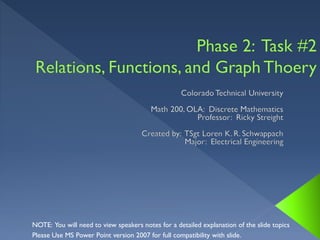Phase 2 task 2 - schwappach
- 1. NOTE: You will need to view speakers notes for a detailed explanation of the slide topics Please Use MS Power Point version 2007 for full compatibility with slide.
- 2. What are ŌĆĀ Relations?: ’āś A relation is an association or connection from one item or object to another. ’āś The item or object could be a number, value, or word. ’āś A database can be envisioned as a central storage center for massive collections of data. ’āś A relational database uses structured rules to define and maintain critical relationships between data. ŌĆĀSee speakers notes for detailed explanation with examples.
- 3. Example of a Relationship: ’āś The three games below have been assigned relationships defined above and are listed in ordered sets. ’āś This is an example of an ŌĆĀ n-ary relationship (explained later), and also fulfills the requirements for a ŌĆĀ function (explained later). ŌĆĀ ŌĆĀ Genre Title Year ŌĆĀFun Factor Relationship Relationship ŌĆĀRPG ŌĆĀFinal Fantasy IV 1991 10 ŌĆĀLegend of Adventure 1986 10 Zelda ŌĆĀRPG ŌĆĀFinal Fantasy VII 1997 10 ŌĆĀSee speakers notes for detailed explanation with examples.
- 4. N-ary and Binary Relations: ’āś In a binary relationship there is a one element to one element limit between two objects in a set. ’āś For example, if you were to take your list of video games and only associate video game names with video game genres you would have a binary relationship. ’āś Discrete Mathematics, seventh edition states ŌĆ£The ŌĆ£biŌĆØ in a binary relation R refers to the fact that R has two columns when we write R as a tableŌĆØ. (Johnsonbaugh, 2009) ’āś In an n-ary relationship there are many elements associated within each set. This relation is best visualized as a table with n- tuple columns. ŌĆĀSee speakers notes for detailed explanation with examples.
- 5. ŌĆĀ ŌĆĀ Binary Relationship Title Genre Final Fantasy IV RPG Final Fantasy VII Adventure Legend of Zelda RPG ŌĆĀ ŌĆĀ Title Genre Year ŌĆĀFun Factor N-ary Relationship ŌĆĀFinal ŌĆĀRPG 1991 10 Fantasy IV ŌĆĀLegend of Adventure 1986 10 Zelda ŌĆĀFinal ŌĆĀRPG 1997 10 Fantasy VII ŌĆĀSee speakers notes for detailed explanation with examples.
- 6. What is a ŌĆĀ Function?: ’āś CTU defines a function as ŌĆ£a relation between objects that requires a unique and distinct mapping for each object in question.ŌĆØ (Colorado Technical University, 2008) ’āś Elizabeth Stapel breaks this idea down further by saying, ŌĆ£A function is a well-behaved relation. Just as with members of your own family, some members of the relation family are better behaved than other. (This means that, while all functions are relations, since they pair information, not all relations are functions. Functions are a sub-classification of relations.)ŌĆØ (Stapel, 2007) ŌĆĀSee speakers notes for detailed explanation with examples.
- 7. Example of a Function: ’āś Using the video game example from relations on previous slide, so long as each element in the set relates solely to another element (A game can be either an RPG or an Adventure, but it cannot both), it fulfills the requirement of a function. ’āś If the game was an Adventure and RPG these rules would break down and it would no longer be a function. ŌĆĀ ŌĆĀ Domain Range Not a Function Domain Range Function Final Fantasy IV ŌĆĀRPG Final Fantasy IV ŌĆĀRPG Final Fantasy VII Adventure Final Fantasy VII Adventure Legend of Zelda Legend of Zelda ŌĆĀFinal Fantasy Adventure ŌĆĀSee speakers notes for detailed explanation with examples.
- 8. What is a ŌĆĀ Graph?: ’āś Graphs provide a visual means for describing the relationships between elements of a set. There are many types of graphs, but since we are learning about database relationshipsŌĆ” ’āś According to Eric Weisstein, ŌĆ£In a mathematician's terminology, a graph is a collection of points and lines connecting some (possibly empty) subset of them. The points of a graph are most commonly known as graph vertices, but may also be called "nodes" or simply "points." Similarly, the lines connecting the vertices of a graph are most commonly known as graph edges, but may also be called "arcs" or "lines."ŌĆØ (Weisstein, 2008) ŌĆĀSee speakers notes for detailed explanation with examples.
- 9. Example: In the graph below illustrates the vertices (nodes) and edges of a graph. ŌĆĀ Key = Nodes = Edges Application: As an application and example to relational databases, each vertex could be used to portray one object and edges can be used to portray relationships. See next ║▌║▌▀Ż. ŌĆĀSee speakers notes for detailed explanation with examples.
- 10. Applied Example: The graph below illustrates the relationships between games, given from our earlier table. ŌĆĀ ŌĆĀSee speakers notes for detailed explanation with examples.











